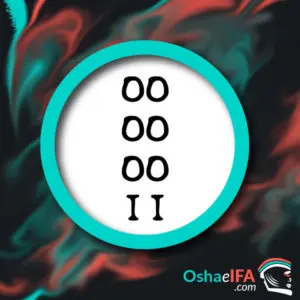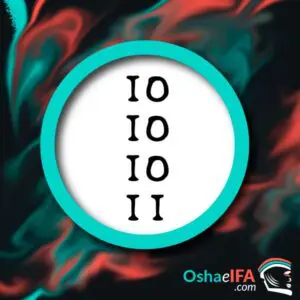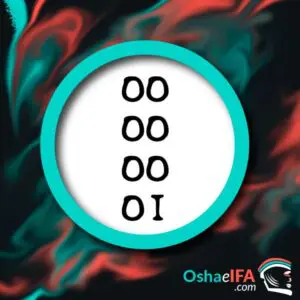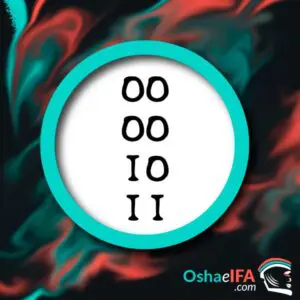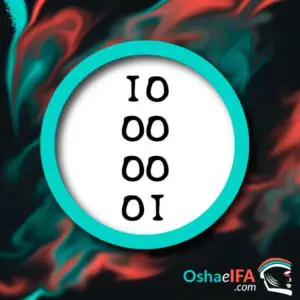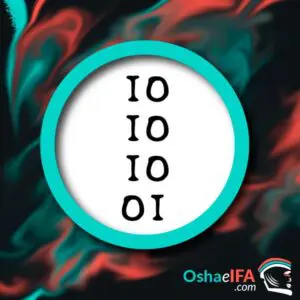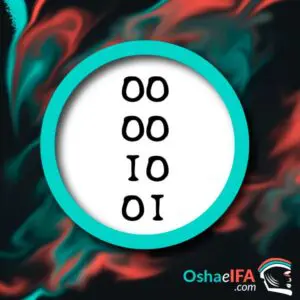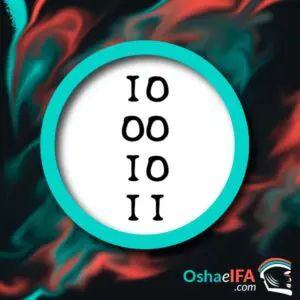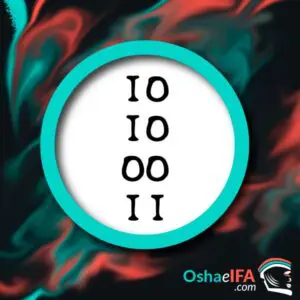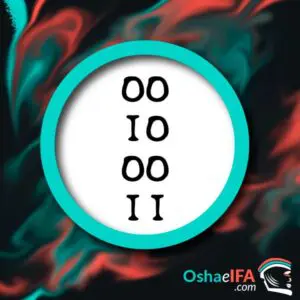Okana say: Meaning, Sayings, Tips and More

Okana Di, is the combination between the older Odu Okanran and Odi, occupies the 125th place in the lord order of Ifa. If it appears for a man in an ordinary register (consultation) he is warned that he has to have his own Ifá. If it appears for a woman, she is warned that she must marry an Awó or persuade her husband to do Ifá for mutual prosperity.
What is born in the odu of Ifa Okana Di?
- Aruyeye. (the scare).
- The seven ocean currents.
- That Awó Okana-Yeku helped Awó OKANA DI.
- That Awó OKANA DI was recognized for the use of force.
- That the cry of the chicken drives away Iku.
- Receive Inle with itá.
- That SHANGO was paranoid.
- Here: YEMAYA Mayelewo speaks.
- You have wealth, but it is fatal in love.
What is the Okana Di sign talking about?
- The three women of ORUNMILA speak: the Spider, the Lizard and the Cockroach.
- SHANGO-OGUN war and competition arises and vice versa.
- The person falls ill from an incade.
- You should not eat animals that collect, or overdue food, or deposited water.
- Here: You must have a duck in your home.
- There are possible trips outside the country.
- YEMAYA was a woman from ORUNMILA.
- Luck arrives and does not enter.
- Azojuano (San Lázaro) arrived at a place with an idea, they were already waiting for it.
- OSHUN gave the wealth with 5 yellow chickens.
- The banana screamed and talked so much that he was killed.
The Okana Odi sign points out:
- Speaks the art of painting, sculpture, casting, and molding metals.
- OKANA DI solved the problem of premature death.
- OKANA DI becomes an institution in the secret cult of ORUN.
- It suffers from sight.
- The herbs are: victor, conquers battle, escalora and spinach.
You may also like: Treaty of the Okana Meyi sign
Okana Di sign recommendations:
Here you must choose between applying force or practicing Ifism. It should not be bragged.
Enchantment and diabolical things should be avoided against the one who offends him.
A rogue son of death can be born to him, who at the same time becomes his enemy and who for his actions condemn both of them.
For an insignificant woman I will see him, due to a third person.
Do not be wise that you become in a war, avoid competitions with others.
Here you can find an enemy with paranoic syndrome, or be it yourself. Give yourself a guinea to your head, goat to Ifá and goat to ESHU and a rooster to OGUN.
Here the woman can be cursed for shunning ORUNMILA.
This Ifa Sign "Okana Odi" marks that a good friendship will appear and a relationship will be reborn.
ORUNMILA said that the sacrifice to ward off Death was made with a small chicken (Oromu-adiye in Yorubá) which yells: Iku-ye-iku-ye ni Oromu adiye ma-nke. With this cry, the chicken orders Death to disappear from the area, because Death is forbidden to hear the chicken's cry. If a person is sick and fears that he or she is about to die, a live chicken is tied on the altar of ESHU so that it screams to death. Death will definitely leave the person.
Sayings of the Odu of Ifa Okana Say:
- In each port you have a love.
- Do not talk more than necessary.
- You must sew your clothes first, before sewing others.
- A black container takes care of everyone, even itself.
- Only ORUNMILA knows the future.
- Each one with his or her brother, which one.
- He who does not go the known path, goes back and finds the others closed.
Says Ifa Okana Di:
When this Ifá appears in IGBODU, the person must make sacrifice with the images of a man and a woman in clay, a goat, red cloth and the OGUN scissors. He must serve death with a rooster, a chicken, and a piece of red cloth at a crossroads.
This (Onó Ifá) special sacrifice must be made immediately so that the person can have a long life, that his son does not kill him and avoid the risk of committing a murder or that a murder is committed in his name. If the person has children, he should be warned that there is one of them who is looking at him with bad eyes.
When Okana Di appears in an ordinary record the person is told that he must make sacrifice before traveling to avoid becoming a victim of unknown consequences.
When this Ifá appears in IGBODU, the person is advised to serve his head with a guinea, Ifá with a goat and ESHU with a goat, so that he can prosper in his work. It should be added that he has an enemy stronger than him. In an ordinary registry the person is told that he must serve OGUN with a rooster and ESHU with a goat to avoid being fired from his job.
Prayer of the Odu Baba Okana Odi:
OKANA DI OFAN KARE BEYA ADIFAFUN ODOLOFA ODOLOYO LOSHELE ABE
LEBO IWO OBINI KAN LOLEFUN EYELE AKUKO LEBO. OKANA DI NI IFA
NI IRE KAFEREFUN SHANGO, OSHANLA ATEI ESHU.
You may also like: All about the Odi Kana sign
Meaning of the Sign of Ifa Okana Di
The Odu OKANRAN DI talks about a relationship that will finally be good.
A friendship or a relationship will be reborn.
Here YEMAYA mayelewo speaks, who was a woman from ORUNMILA and later a merchant. She is the one who uses a mask. Use nine different colors, live in a jar. He eats from all the animals and is put on an okpel.
She lives in the middle of the ocean where the seven ocean currents pass.
Here they speak: The movements of the Earth and of the seven marine currents of fresh water that are said to be on the seabed.
The seven seas speak.
You have to take good care of your eyesight. You cannot drink water deposited in a jar, much less put your mouth on the edge of the jar to drink it directly from it. You should not eat any type of crustaceans or animals that recoil.
You have to do Ebo frequently to avoid falling
The owner of this Odu has to be doing Ebo periodically and wearing clothes from the YEMAYA list.
Here INLE saves from betrayals. ESHU saves health. Open the roads with chicken, Obi Omi Tutu and other ingredients.
In this Sign of Ifa "Okana Di" the dead save daily, one must identify with them.
For luck, ORUNMILA is given 2 black hens with three nails, which are loaded on his head with: blood from the hens and asheses. The three nails are buried in the door of the house.
This Odu speaks of loneliness, boredom, orders to marry and have a family to be happy. It should be reserved.
Mice, cockroaches, lizards should not be killed.
The debt with OSHUN and ESHU must be met. Put a white plate with five eggs and honey to OSHUN for love and prosperity.
It is necessary to avoid being pamplinoso.
Beware of traps that a religious can make you.
For Okana Di you have to receive INLE with a white ram so that it has Itá.
For this Oddun when they cannot with the father for being powerful, they do things to the son.
Here INLE with the Ejá-Oro (guabina), defeated the enemies, helped by EGUN. Here what is desired is achieved, but joy can turn it into a boumerang against itself, it should speak little.
Odu Okana Odi Ifa Code of Ethics:
The Awó identifies with his Egun so that they save him daily.
Pataki of the sign of Ifa Okana Odi:
HOW THIS OKANA DI SOLVED THE PROBLEM OF PREMATURE DEATH.
ORUNMILA NI KI OLOKONRON TELL HIM, MONI KI OLOKONRON TELL HIM.
ORUNMILA told Okonron to close the hole in the ground.
I also told Okonron to close the hole in the ground. ORUNMILA said that the sacrifice to remove Death was made with a small chicken (Oromu-adiye in Yorubá) which yells: Iku-ye-iku-ye ni Oromu adiye ma-nke. With this cry, the chicken orders Death to disappear from the area, because Death is forbidden to hear the chicken's cry. If a person is sick and fears that he or she is about to die, a live chicken is tied on the altar of ESHU so that it screams to death. Death will definitely leave the person.
You may also like: All about the Odun of Ifa Odi Meji
Okana Di Ifa Traditional
Òkànràn òdí.
Òkànràn din din kúù din kúù din
A day fún Owú
Èyí tí n sògbògbò àrùn
You n najú aláì le nde
Wón ní ebo ara Líle ni kó Rú
Owú ní n se jègèjègè lÁgbède
Wón ní kó rubo kí ara è ó le
Wón ní wón or jàn an jàn an
Ipá ò níí kà a
Èmí è or sì gùn
Owú bá rubo
Ebo è ba dà
Òkànràn din din kúù din kúù din
A day fún Owú
Èyí tí n sògbògbò àrùn
You n najú aláì le nde
Wón ní ó rbo
Owú gbébo nbè ó rbo
Ó rbo tán lará bá le
a ní mo ti sebo
Mo ti tallow Òkànràn dindin kúù din kúù din
Mo rubo Òkànràn di n din kúù din kúù din
Neither Owú n wí lÁgbède.
Ifá says that this person would be full of longevity. He would enjoy his life; but he must offer sacrifice of Òkànràn Òdí.
Òkànràn dindin kúù din kúù din
He made divination for the Mold
Who was arrested for the disease
And seen unable to stand up
They told him to offer sacrifice for good health
The Mold had previously been ill in the blacksmith's shop
They asked him to sacrifice for good health and vitality
They told him 'No matter how much they beat him and beat him'
'Nothing would get over it'
'You too will have a long life',
The Mold made the sacrifice
And his sacrifice was accepted
Òkànràn dindin kúù din kúù din
He made divination for the Mold
Who was arrested for the disease
And seen unable to stand up
They advised him to make sacrifice
The Mold heard of the sacrifice and performed it
He finished performing the sacrifice and became strong and healthy
He would say 'I have offered sacrifice'
'I have offered the sacrifice of Òkànràn din din kúù din kúù din
I have performed the sacrifice of Òkànràn din din kúù din kúù din
It is what the Mold is singing in the blacksmith's shop to date.
